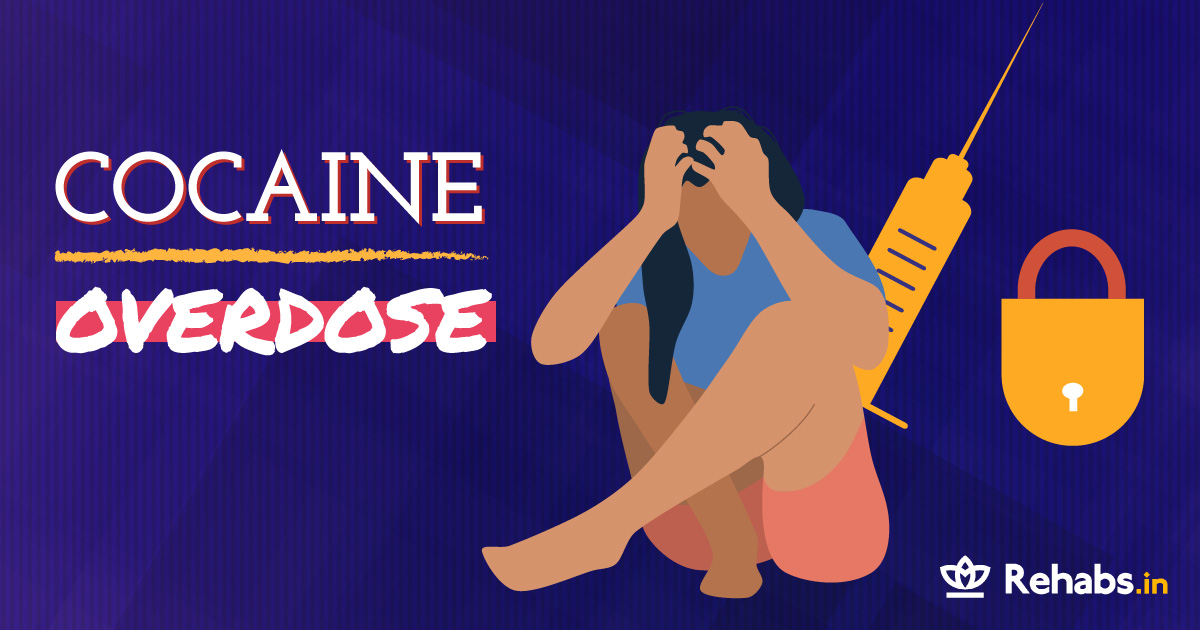What Is Cocaine Overdose?

The following blog has been reviewed by a Psychologist. If you are reading the blog on a mobile phone, you can see the reviewer’s profile at the end of the blog. Please see our editorial policy here.
Cocaine overdose is common among cocaine abusers. Mostly, cocaine overdose happens after having a large dose during binges. While binging an individual takes cocaine in a back-to-back dosing manner, and the quantity of drug increases in their body; so the body wouldn’t be able to metabolise it fast enough. This causes cocaine overdose and builds up the toxicity in their body.
Findings of many studies show that cocaine induces serious life problems. People can develop a habit of overdosing on cocaine which can occur irrespective of dose, frequency, and method of use. There have been cases of cocaine overdose from a few hundred milligrams. At the same time, other users can ingest several grams of cocaine without overdosing, as per the study of the University of Arizona.
Cocaine is an illegal stimulant drug that can be highly addictive. When people take it in a high dose, their head and body may become powerfully overstimulated, and this condition is known as a cocaine overdose. During a cocaine overdose, an individual can feel from mild palpitation to respiratory arrest.
In this blog, RehabPath will give you an overview of everything related to a cocaine overdose through covering these points:
- Signs & Symptoms of a Cocaine Overdose
- Dangers & Risk Factors of a Cocaine Overdose
- How Much of Cocaine Intake Leads to Overdose?
- How Cocaine Overdose Affects Different Parts of the Body?
- How the Diagnosis of Cocaine Overdose Takes Place?
- How to Get Right Help for Cocaine Overdose – Treatment Process
- What Should You Do for a Person During Cocaine Overdose?
- Cocaine Overdose Scenario in India
Continue reading to know everything mentioned above.
Signs & Symptoms of a Cocaine Overdose
If you suspect that someone you know is using cocaine, it may be beneficial for you to know the signs & symptoms of a cocaine overdose. It can be life-saving for them if you help them to take the right treatment after understanding their condition.
When people do cocaine abuse, their body goes through a large number of sensations, and changes due to strong stimulant effects of cocaine. The likelihood of a cocaine overdose can be influenced by a number of signs & symptoms depending upon the route of administrations and health history of the users.
These are the four common symptoms of a cocaine overdose:
- Physiological Changes – Physiological changes can occur within the body of a person after having an excessive dose of cocaine. These changes are very common signs of a cocaine overdose, and anyone can quickly notice them in a cocaine abuser. These changes can lead to life-threatening consequences, if not treated on time.
Here are a few signs of cocaine overdose mentioned below to understand physiological changes:
- Chest pain
- Dilated pupils
- High blood pressure
- Palpitations
- Loss of control over urination
- Increase in body temperature
- Sweating
- Nausea
- Lightheadedness
- Behaviour Changes — Cocaine abuse causes so many drastic changes to the person. However, when abusers get an overdose of cocaine, personality and behaviour changes can become even more pronounced. Severe changes in behaviour can be seen, such as paranoid, mood swings, or acting like a totally different person.
Signs of cocaine overdose to understand behaviour changes include:
- Panic
- Anxiety
- Severe confusion
- Hallucination or delusions (Lack of awareness about surroundings)
- Deliriousness
- Agitation
- Doing unusual things
- Strange behaviour towards family, or friends
- Physical Change — One of the very common symptoms of cocaine overdose is a change in the skin tone or colour of the cocaine abuser. When people have many high doses of cocaine in a short span of time, it causes an overdose, and their body tone starts turning bluish in colour. Body parts of the person such as lips and nails of fingers may appear bluish in colour.
If you see an individual’s body severely looks pale or has bluish tint on their body parts after having cocaine, at that time you need to seek emergency help because it may be possible, the person has a cocaine overdose.
- Medical Changes — There may be two types of medical changes that can be seen in a person who has a cocaine overdose: difficulty in breathing and seizures.
- Difficulty in breathing — Having an excessive dose of cocaine, especially through the route of injecting or snorting can be dangerous, and may quickly lead to overstimulation in the body of a person. It may result in having difficulty in breathing or rapid breathing. People with cocaine overdose may not be able to slow their breath on their own, and it can lead to an increase in heartbeat or palpitations.
- Seizures — Seizures are the symptoms of an excessive overdose of the drug, which may lead to death as well due to severe body conditions of the person if treatment is not provided on time. In the case of seizures ignoring the condition of the person can be dangerous. Even if seizing stops suddenly you should get emergency help because it doesn’t mean that danger has passed. Seek an emergency medical care right away, as it may recur.
A study of non-fatal cocaine overdose among injecting cocaine users (ICU) and non-injecting cocaine users (NICU), found out the symptoms of a cocaine overdose in different kinds of people and their data is mentioned in this graph:
It says among ICU, seizures (23%), passing out (19%) and palpitation (16%) were the most commonly reported symptoms of overdose, where among NICU, passing out (29%), anxiety (14%) and vomiting (14%) were reported. However, 41% of ICU, and 50% of NICU, reported that they would not be able to recognise a cocaine overdose.
Dangers & Risk Factors of a Cocaine Overdose
Cocaine is among the most dangerous stimulants sold illegally, primarily because of its potential for overdose. However, serious users are more in danger of suffering an overdose than casual users of cocaine as it affects the body severely while using it in a pattern of bingeing.
People who use cocaine on a regular basis are at high risk of a cocaine overdose. However, severe risk factors of a cocaine overdose include:
- Addiction — Cocaine addictive people are more likely to have an overdose due to the compulsive use of cocaine. It involves an overwhelming urge to take an excessive dose of cocaine regularly for a more extended period than intended. This addictive behaviour of a person may lead to a cocaine overdose.
- Using high concentrated forms of cocaine — Using cocaine regularly develops tolerance and users may start looking for high concentrated forms of cocaine which increases the risk of a cocaine overdose.
- Using cocaine in warm weather or while dehydrated — An abrupt life-threatening overdose reaction can occur in warm weather due to the dehydration in the body. It is a severe risk for the people living in hot weather and using cocaine.
- Using cocaine with other drugs — It increases the risk of a cocaine overdose due to the combined effects of two different stimulants. As using cocaine in itself is very risky, adding it with other drugs will make it lethal.
Alcohol and heroin are the most widely used drugs with cocaine to increase the euphoric effects. Using them together is equal to putting your body in the middle of a tug-o-war which is going to be extremely dangerous.
Mixing cocaine with alcohol provides a toxic chemical byproduct which is known as ”cocaethylene.” Though cocaine in itself is a potent drug, cocaethylene is reputed to be more euphorigenic and rewarding than cocaine but it increases cardiovascular toxicity more than either drug alone.
- Tolerance — As a person uses cocaine regularly, it means they become tolerant over time which is why people often increase the dose of cocaine. Continually increasing the dose in order to get euphoric effects from it will become a significant risk factor to create cocaine overdose problems.
How Much Cocaine Intake Leads to an Overdose?
Wondering how much cocaine intake may provoke a cocaine overdose? Cocaine is significantly more dangerous after an overdose; the best way to describe an overdose of cocaine is an intoxication in the body of users.
It is so hard to predict the exact amount of cocaine it takes an individual to overdose as a chronic user may build a tolerance to the limit of cocaine which can cause an overdose in another individual. However, statistics show that males are more likely to overdose on cocaine than females, with regards to gender and the ratio of male to female cocaine overdoses is 3:1.
The route of administration of cocaine into the body, tolerance, gender, amount of cocaine, a form of cocaine, etc., are the factors which play an essential role to decide the overdose limit of a cocaine overdose.
How Cocaine Overdose Affects Different Parts of the Body?
In cocaine overdose, a person shows immediate and harmful effects on the body due to the high dose consumption of cocaine.
The heart and brain are the most vulnerable organs to an overdose which you can also guess by the signs and symptoms of a cocaine overdose. However, the effect on the body organs depends on the type of cocaine effects such as short-term or long-term effects.
Cocaine effects on any person arise after the interaction with the drug on a wide range of bodily processes, and cocaine is a drug which shows its effect immediately — and eventually, its impact is deadly on the organs — due to overstimulation throughout the body.
A cocaine overdose affects the organs in these four primary systems of the body:
- An increase in ”fight or flight” responses such as blood pressure, heart rate, etc.
- Increasing metabolism
- By affecting CNS – overstimulation in the nervous system
- Constriction of blood vessels of the person
Some of the major problems include:
- Heart problems — An excessive dose of cocaine massively affects the heart with severe chest pain or pressure due to the constriction in coronary arteries that transfer blood to the heart.
With less blood for some time, the heart may start starving for pureblood with oxygen. This situation may lead the heart to pump harder and faster to deliver more blood and compensate for its own poor supply; however, it does so in vain due to the constriction in arteries.
Ultimately, it created the whole situation of a heart attack or stroke because this is a deadly cycle of the heart. Even a healthy person can face a heart attack or stroke due to this condition in a cocaine overdose.
Blood pressure and increase in heart rate may also lead to a dangerous situation due to an overdose of cocaine. A person who doesn’t have a healthy lifestyle and already has high blood pressure problems or heart problems may face irregular rhythms of the heart after an excessive dose of cocaine. Also, there may be a possibility of death in a severe condition.
- Central nervous system (CNS) problems — Cocaine, especially, produces an intense and high stimulation in the brain as it rapidly floods it with dopamine. The high stimulation usually stays for a short period of time until a few doses. Typically cocaine abusers don’t stop it after a few doses; instead, they have it in a binge pattern to extend the feeling of euphoria.
The crash phase comes after an excessive binge dose of cocaine which affects the brain severely by leaving a person feeling extremely depressed, mentally confused, irritable, and intense cravings follow it. Regular cocaine overdose can lead to paranoia and affect the CNS negatively, which may cause sudden cardiac arrest, hypertension, seizures, or convulsions.
- Other body organ’s problems — A few other body organs also get affected by a cocaine overdose which includes –
- Muscle bones — A cocaine overdose may result in life-threatening metabolic imbalance
- The eyes — Pupil dilation that may affect visual acuity
- Intestine & Kidneys — An excessive dose of cocaine may lead to metabolic acidosis, perforated ulcers, and insufficient blood supply.
Diagnosis of Cocaine Overdose
According to the UNODC report, about 275 million people worldwide, which is roughly 5.6 per cent of the global population aged 15-64 years, are estimated to have used an illicit drug at least once during 2016.
The same report also shows that around 31 million people who use drugs suffer from drug use disorders which means their drug use is harmful, and they may need to go for the diagnosis and treatment. People who witnessed an overdose among these were mostly using cocaine or heroin. Also, many people who use cocaine or combine it with heroin, through injection, report that they have experienced a non-fatal overdose.
Timely diagnosis for cocaine overdose can save the life of a cocaine abuser. When a patient reaches the hospital after consuming and facing symptoms of cocaine, the medical staff performs cocaine overdose management. They observe the condition of the patient’s heart rate and diagnose accordingly.
They may perform some tests to diagnose the drug levels and monitor the patient’s health as per the reports of the tests as along with whatever the user and their family members provide information. The tests will help doctors to check the level of cocaine and its metabolite chemicals, as well as if any other drug is present in the system which the user may have taken together or before having cocaine.
There are different types of tests which take place:
- Urinalysis to check the function of kidney & liver
- Blood analysis for cardiac enzymes, blood acidity level, and complete blood count
- There will be a chest x-ray in severe condition to see the condition of the lungs
- CT scan of the user’s head if any kind of injury or bleeding is suspected in severe cases
- Toxicology screening
How to Get Right Help for Cocaine Overdose – Treatment Process
According to a recent study conducted by the WHO, more than 40% of countries cover the treatment for cocaine high (overdose) patients.
According to a recent study conducted by the WHO, treatment coverage is somewhat limited with only 18.5% of 82 responding countries reporting high coverage (40% or more) for opioid dependence.
After the patient’s diagnosis, doctors prescribe medication if needed, or therapies depending on the condition of the patient. Though there is no FDA approved specific antidote for cocaine overdose, but for the sake of emergency treatments for an overdose, there are a few useful medications which include:
- Vasopressin
- Benzodiazepine
- Calcium channel blockers
Vasopressin — In cardiac arrest due to cocaine toxicity doctor prescribes vasopressin due to its considerable theoretical advantages. It increases coronary blood flow and myocardial oxygen availability as well.
Benzodiazepine — It is a sedative drug and may be administered intravenously in patients if needed to manage the hyperexcitable state associated with cocaine overdose. In emergency treatment of increased body temperature due to cocaine overdose, benzodiazepine is prescribed with physical cooling. The chest pain and high blood pressure may also be treated with a benzodiazepine.
Calcium channel blockers — It may be used to treat hypertension and coronary arterial vasoconstriction, however, it doesn’t lower tachycardia based on all cocaine-related studies. Diltiazem and verapamil are non-dihydropyridine calcium channel blockers which are more preferable.
Prior to leaving the emergency treatment, the medical staff may ask patients to get a psychiatric evaluation for further diagnosis and therapy treatment.
What Should You Do for a Person During Cocaine Overdose?
If you suspect that someone is experiencing a cocaine overdose, it is vital to seek medical emergency help right away. Immediate medical treatment is the best help to do for an individual while cocaine toxicity.
You can do a few other things as well while the help is on the way:
- If a patient is having seizures, then make sure they don’t hurt themselves by anything near to them.
- You should get a cold compress and put it on their body to lower the body temperature associated with cocaine overdose.
- Don’t leave them alone till medical help arrives.
Cocaine Overdose Scenario in India
According to an NCB report drugs seized across India increased 300% between 2012 and 2017 with 3.6 lakh kgs seized in 2017 alone.
According to drug policy in India, quantity-based punishment for each drug is attached below:
This list shows that a person having cocaine 2g would be charged for Rs 10,000 and/or maximum of 1-year rigorous imprisonment, and 100g cocaine would face punishment for rigorous imprisonment from 10 years (min) to 20 years (max) also a fine from Rupee 1 lakh to 2 lakh. Quantity greater than small but lesser than commercial (intermediate) would be punished for rigorous imprisonment that may extend to 10 years & fine that may extend to Rs 1 lakh.
Bottom Line!
People are using cocaine and many other drugs by combining them together, which leads to severe health issues. Assessment of and treatment for cocaine overdose is vital to success only with prompt treatment. Cocaine toxicity is survivable. To prevent the long-term consequences of an overdose, you or your loved ones who have a cocaine overdose or cocaine addiction should seek medical treatment at a recovery centre as soon as possible.
Generally, long-term recovery from cocaine overdose requires individualised care so that patients are able to overcome the compulsions associated with cocaine toxicity and can develop healthier habits.
Sources
- https://en.wikipedia.org/wiki/Cocaine_intoxication
- https://www.ncbi.nlm.nih.gov/books/NBK430976/
- https://www.ncbi.nlm.nih.gov/pmc/articles/PMC2703432/
- https://methoide.fcm.arizona.edu/infocenter/index.cfm?stid=217 https://deserthopetreatment.com/stimulants/cocaine-addiction/overdose/
- https://www.healthline.com/health/addiction/does-cocaine-kill-brain-cells#causes












